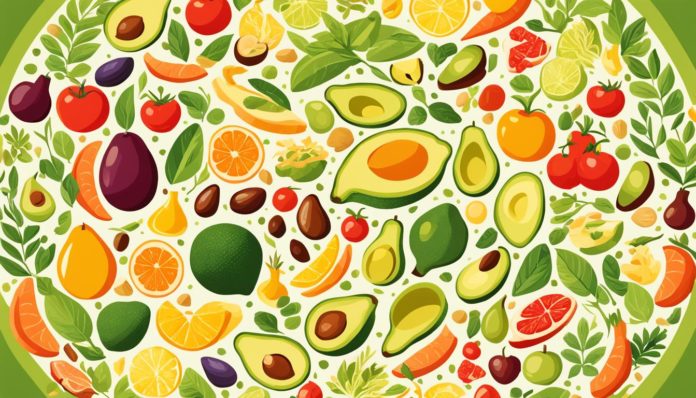Omega-9 fatty acids are not as well-known as omega-3 and omega-6. But, they are very important for a healthy diet. These fats are found in many foods and have great health benefits. Knowing about omega-9 can make a big difference in your heart health and general well-being.
Key Takeaways
- Omega-9 fatty acids are crucial for a balanced diet.
- These fats offer significant oleic acid health advantages.
- They are primarily found in foods like olive oil and avocados.
- Incorporating omega-9s can improve cardiovascular health.
- Understanding their role can enhance overall wellness.
What Are Omega-9 Fatty Acids?
Omega-9 fatty acids are a type of monounsaturated fat important for our health. They are different from other fats because they have a unique chemical structure. This structure has the first double bond at the ninth carbon from the omega end. Knowing about Omega-9s helps us understand their benefits for our health.

Definition and Classification
Omega-9 fatty acids are monounsaturated fats with chemical features that set them apart. Unlike omega-3 and omega-6, our body can make omega-9 fats. Some common types are oleic acid, erucic acid, and mead acid. They are key for a balanced diet and get grouped by their structure and health advantages. For more details, check out studies on omega-9 fatty acids.
Role in the Human Body
Omega-9 fatty acids play a big role in our cells and metabolism. They are part of cell walls, helping them stay flexible and work well. Also, these fats can help manage cholesterol levels and support heart health.
Their anti-inflammatory features are seen in many studies, offering hope for treating skin and gut issues. Omega-9s are also crucial for our body’s functions. Eating foods rich in omega-9, like olive oil and avocados, is beneficial.
Health Benefits of Omega-9 Fatty Acids
Eating foods with omega-9 fatty acids has many health benefits. Studies show how essential these fats are for our well-being. They play a big role in keeping our bodies healthy.
Cardiovascular Health
Omega-9 fatty acids, like oleic acid, are great for the heart. They can lower bad cholesterol and boost good cholesterol. This helps your heart work better. Adding omega-9s to your diet can also lower blood pressure. This is key in preventing heart trouble and strokes.
Inflammation Reduction
Reducing inflammation is a big benefit of omega-9s. Long-term inflammation leads to many serious health problems. Omega-9s, especially oleic acid, can fight off inflammation. This helps keep you healthy and feeling good.
Improved Cognitive Function
Omega-9s help your brain work better too. They support better mood, memory, and brain function. As we get older, this becomes very important. Oleic acid also keeps brain cells in good shape. This helps avoid mental decline.

Sources of Omega-9 Fatty Acids
It’s important to add omega-9 fatty acids to your diet for good health. You can find these fats in both plant and animal foods. This makes it easy to fit them into any diet. Here are some main sources of omega-9s.
Plant-Based Sources
There are many plant sources of omega-9. They make it easy to add nutrition to your diet. Some common ones include:
- Olive Oil: Olive oil, high in oleic acid, is a kitchen essential and great for omega-9.
- Avocados: Avocados have lots of omega-9, plus they’re full of nutrients and fiber.
- Almonds: A handy and delicious way to increase omega-9 intake.
- Pecans: Pecans are another good source of omega-9 and offer health benefits too.
- Cashews: Rich in omega-9, cashews are versatile in many recipes.
Animal-Based Sources
Omega-9 is also found in animal products. They help keep your diet balanced. Here are some examples:
- Pork: Pork is rich in omega-9 fats and is a flexible protein source.
- Chicken: Chicken, especially the dark parts, is a good omega-9 source.
- Eggs: Eggs offer proteins and help with omega-9 levels.
- Cheese: Cheddar and gouda are types of cheese with lots of omega-9.
For more details, check out this resource on essential fatty acids. It’s quite informative.
Omega-9 Rich Foods
Eating foods high in Omega-9 fatty acids can really boost your health. Olive oil and avocados are great picks. They’re not only packed with Omega-9s but also offer many benefits. They’re perfect for a healthy diet.
Olive Oil
Olive oil is a top choice for Omega-9. It’s full of good fats that help your heart and fight inflammation. It can lower bad cholesterol and raise good cholesterol. This keeps your heart strong. Olive oil also fights off diseases, keeping you well.
Using olive oil daily is easy. Dress your salads with it, drizzle over veggies, or cook with it. It adds a healthy boost to any meal.
Avocado
Avocados are another great Omega-9 source. They’re good for your heart, help with weight, and are packed with nutrients. The good fats in avocados lower bad cholesterol and increase good cholesterol. They’re great for your heart’s health.
You can add avocados to lots of meals. Enjoy them on toast, in salads, or in smoothies. Their creamy texture and rich nutrients make them a tasty and healthy option.
“Both olive oil and avocados are powerhouse Omega-9 foods that deliver a multitude of health benefits. Incorporate these foods into your diet for a heart-healthy, anti-inflammatory boost.”
How to Incorporate Omega-9 Fatty Acids into Your Diet
Adding Omega-9 fatty acids to your diet is key for good health. It’s important to know how much to have daily and to find tasty ways to include these fats in your food.
Daily Recommendations
The amount of omega-9 you need varies by your diet and lifestyle. There isn’t a set amount you must have because your body makes omega-9. But, eating a balanced amount of good fats, including omega-9, is good for your heart and can reduce inflammation. Health Care Navigator has more info on important nutrients and omega-9.
Meal Ideas and Recipes
There are fun ways to make sure you’re getting enough omega-9. Adding olives, avocados, and nuts to your food is an easy way to up your intake. Here are some ideas and omega-9 recipes to start:
- Avocado Toast: Spread mashed avocado on whole-grain toast and sprinkle with chia seeds.
- Olive Oil Salad Dressing: Mix extra virgin olive oil with balsamic vinegar, a pinch of salt, and pepper for a tasty salad dressing.
- Nutty Snack Mix: Mix almonds, walnuts, and macadamia nuts for a healthy snack.
For more on omega-3, omega-6, and omega-9 fats, see this Healthline article.
| Daily Recommendations | Recipe Ideas |
|---|---|
| Include a variety of healthy fats in moderation | Avocado Toast |
| Focus on natural sources like olive oil and nuts | Olive Oil Salad Dressing |
| Balance omega-9 intake with omega-3 and omega-6 | Nutty Snack Mix |
By knowing how to balance omega fats, you improve your diet for better health. Try these ideas and meals to gain more benefits from omega-9 fats every day.
The Importance of Balance with Omega-3 and Omega-6
Our diets today often lean too much towards omega fatty acids imbalance. It’s crucial to have a good omega fatty acids balance for your health. You should think carefully about your omega-3, omega-6 ratio.
Having too much omega-6, without enough omega-3, can cause inflammation and other health problems. A diet rich in omega-3s can lower inflammation, help your heart, and boost your brain. Adding omega-9 to the mix gives extra benefits, without the risk of inflammation.
To make good dietary changes, consider these tips:
- Incorporate fatty fish like salmon and mackerel to boost omega-3 intake.
- Use oils high in omega-9, such as olive oil, for cooking and dressings.
- Limit processed foods and vegetable oils high in omega-6 to achieve a healthier omega-3, omega-6 ratio.
Getting the right omega fatty acids balance means making smart choices. Learn the importance of omega-3, omega-6 ratio and use these fats to improve your health.
Omega-9 Fatty Acids (Oleic Acid) and Heart Health
The link between omega-9 fatty acids, mostly oleic acid, and heart health is well-studied. Many studies show the benefits of adding these fats to a heart-healthy diet. We’ll explore what science says and how to use this info.
Scientific Evidence
Recent omega-9 scientific research shows oleic acid’s good effects on heart health. The American Heart Association (AHA) found that oleic acid can lower bad cholesterol (LDL) while raising good cholesterol (HDL). This helps reduce heart disease risk. A Journal of Clinical Lipidology study showed people who ate a lot of oleic acid had better lipid profiles and less inflammation.
The Mediterranean diet, rich in olive oil and oleic acid, is a great example of heart-healthy eating. By eating like this, you can get the benefits of omega-9 fatty acids.
Practical Tips
Adding heart-healthy diet tips to your life is easy and beneficial. Here’s how to begin:
- Use Olive Oil: For cooking and baking, switch butter or margarine with olive oil. It’s high in oleic acid, boosting your meal’s omega-9 levels.
- Snack on Nuts: Eat nuts like almonds and cashews. They’re full of omega-9 fatty acids.
- Eat Avocados: Add avocados to salads, sandwiches, and smoothies. They’re packed with oleic acid and vital nutrients.
- Follow the Mediterranean Diet: Try the Mediterranean diet. It focuses on healthy fats, fruits, veggies, and whole grains.
By adopting these heart-healthy diet tips, you can easily up your oleic acid intake and boost heart health.
The Role of Omega-9 Fatty Acids in Weight Management
Omega-9 fatty acids are key to managing weight. They improve heart health and help control hunger. Adding Omega-9s to your diet helps you meet your weight goals.
Metabolism Boost
These fatty acids boost your metabolism, crucial for weight loss. A better metabolism burns calories faster. This makes your body more efficient at using food for energy, helping you during workouts.
Satiation and Hunger Control
Omega-9 fatty acids also help you feel full longer. Eating foods with Omega-9 can manage your hunger and cravings. Feeling satisfied helps you eat less, supporting your diet and weight management efforts.
| Benefits | Details |
|---|---|
| Omega-9 Weight Management | Supports effective weight management strategies |
| Metabolism | Enhances calorie-burning efficiency |
| Satiation Benefits | Reduces hunger and cravings |
Potential Downsides of Excessive Omega-9 Intake
Omega-9 fatty acids are good for you, but too much can be a problem. It’s important to balance your omega-9 intake with other nutrients. This avoids the risks of taking in too many nutrients.
Identifying Excess
To spot too much omega-9 intake, look out for certain signs and what you eat. Too much omega-9 can mess up your body’s omega-9 balance. This leads to bad health effects. Watch out for stomach problems, inflammation, and not having the right balance of fatty acids.
Balancing with Other Nutrients
Eating a balanced diet helps avoid taking in too many nutrients. Make sure omega-9 fats go well with omega-3 and omega-6 fats. The right balance of omega-9 supports your health and reduces risks from other nutrient imbalances.
Here is a useful table showing the right balance of omega fatty acids:
| Fatty Acid | Recommended Ratio |
|---|---|
| Omega-3 | 1 |
| Omega-6 | 4 |
| Omega-9 | 5 |
Following these ratios helps manage your nutrient intake well. It avoids too much omega-9 intake. This way, you promote better nutrient use and well-being.
Omega-9 Fatty Acids in Special Diets
Omega-9 fatty acids are vital in many diets, like vegetarian, vegan, keto, and low-carb. They help improve health and match the benefits of each diet plan.
Vegetarian and Vegan Diets
Vegetarians and vegans can get enough Omega-9 from plants. Olive oil, avocados, and nuts are good picks. These foods boost health and add nutrients missing from animal products.
Keto and Low-Carb Diets
In keto and low-carb diets, Omega-9 fatty acids are key too. Foods high in oleic acid like avocados and olive oil fit well in these diets. They help heart health, metabolic activities, and provide lasting energy.
| Food Source | Omega-9 Content | Suitable Diet |
|---|---|---|
| Olive Oil | High | Vegetarian, Vegan, Keto, Low-Carb |
| Avocado | High | Vegetarian, Vegan, Keto, Low-Carb |
| Almonds | Moderate | Vegetarian, Vegan, Keto |
| Macadamia Nuts | High | Vegetarian, Vegan, Keto, Low-Carb |
Whether you’re on a keto, low-carb, or plant-based diet, these foods offer balanced nutrition. High-quality oils and nuts are key for these diets’ benefits.
Supplements vs. Whole Foods: Getting Your Omega-9s
When thinking about adding Omega-9 fatty acids to your diet, you have choices. These include Omega-9 supplements and foods rich in Omega-9s. Knowing the pros and cons of each can help you decide.
Omega-9 supplements are a quick way to get your monounsaturated fats. They are great for people who have diet limits or need extra nutrients. You can easily add them to your daily routine.
But, getting Omega-9s from foods like olive oil, avocados, and nuts has big benefits. These foods give you not just Omega-9s but also vitamins, minerals, and antioxidants. These help your overall health.
| Criteria | Omega-9 Supplements | Whole Food Sources |
|---|---|---|
| Convenience | High | Moderate |
| Nutritional Value | Medium (limited to Omega-9) | High (rich in multiple nutrients) |
| Cost | Varies | Varies |
| Bioavailability | High | High |
| Health Benefits | Targeted for Omega-9 | Comprehensive |
Although Omega-9 supplements can be important, especially for those with special diet needs, whole foods offer more health gains. Still, supplements are a solid way to make sure you get enough Omega-9.
Conclusion
This article has shown us the big benefits of omega-9 fatty acids. We learned how important omega-9s, especially oleic acid, are for our hearts, brains, and reducing inflammation. It shared how eating more omega-9s can help our health in many ways.
We can find omega-9s in foods like olive oil and avocados, and some come from animals. It’s also key to eat a balanced diet with omega-3 and omega-6 for best health. Whole foods are better than supplements because they give us more nutrients.
In short, omega-9 fatty acids are key for a healthy diet. Adding these fats to our meals helps our heart, helps us manage our weight, and boosts our overall health. To make sure we eat right for our specific health needs, we should talk to a doctor or a nutrition expert.
FAQ
What are the benefits of Omega-9 fatty acids in your diet?
Omega-9 fatty acids, especially oleic acid, are good for your heart, reduce inflammation, and help your brain work better. They are important for a healthy diet. They help with cell and body functions.
What are Omega-9 fatty acids?
Omega-9 fatty acids are a type of fat the body can make. They are not essential but important. They are in many foods and keep cells and metabolism healthy.
How do Omega-9 fatty acids benefit cardiovascular health?
Omega-9 fatty acids, like oleic acid, lower bad cholesterol and raise good cholesterol. This reduces heart disease risk. Diets high in these fats are good for the heart.
What are the primary plant-based sources of Omega-9 fatty acids?
Good sources of Omega-9s include olive oil, avocados, and nuts like almonds. These foods are healthy and easy to add to your diet.
How can olive oil contribute to Omega-9 intake?
Olive oil is full of oleic acid, an Omega-9 fat. Use it for cooking or salad dressings. It improves heart health and lowers inflammation.
What are some meal ideas for incorporating Omega-9 fatty acids into a diet?
To get more Omega-9s, use olive oil on salads, add avocados to meals, and eat nuts. These add flavor and health benefits.
How important is the balance between Omega-3, Omega-6, and Omega-9 fatty acids?
It’s important to balance Omega-3, Omega-6, and Omega-9 fats for health. A good balance helps with inflammation and heart health. Choose foods that provide this balance.
What does scientific evidence say about the role of Omega-9 (Oleic Acid) in heart health?
Studies show Omega-9s, especially oleic acid, are good for the heart. They manage cholesterol and lower inflammation. Groups like the American Heart Association support using these fats for heart health.
How do Omega-9 fatty acids help with weight management?
Omega-9 fats may help you manage weight by keeping you full and boosting metabolism. This helps you eat less and supports weight loss goals.
Are there potential downsides to excessive Omega-9 intake?
Too much Omega-9 can upset the balance of fats and nutrients in the body. It’s best to enjoy these fats in moderation as part of a balanced diet.
How can Omega-9 fatty acids fit into vegetarian and vegan diets?
Vegetarians and vegans can easily get Omega-9 from olive oil, avocados, and nuts. These are versatile foods that fit various diets.
Is it better to obtain Omega-9 fatty acids from supplements or whole foods?
It’s best to get Omega-9 from foods like olive oil and avocados. They offer more nutrients and benefits. Supplements can help in some cases, but whole foods are preferred.


